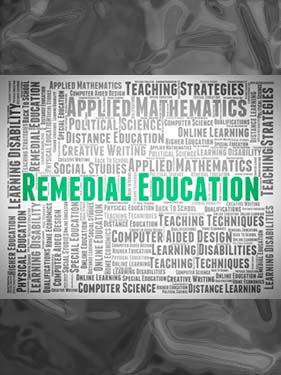It’s no secret that many students entering college are unprepared for the rigor of college-level coursework. As such, students enroll in developmental or remedial coursework with the expectation of acquiring the skills needed for college-level coursework. Among students first enrolled in 2010-2011, 51% of community college students enrolled in developmental education compared to 29% of public four-year students (NCES, 2016; as cited by Schak, Metzger, Bass, McCann, & English, 2017). Developmental education continues to be a significant barrier for many students, especially those enrolled at community colleges. More than half of entering community college students require at least one developmental education course; many of these courses are mathematics courses (Chen & Simone, 2016; Complete College America, 2012; Schak et al., 2017). As mathematics courses are a barrier to college-level coursework, students are less likely to progress through their degree or certificate programs, or transfer to four-year institutions (Bahr, 2013; Complete College America, 2012).
Recently, the United States Department of Education released a report titled Developmental Education Challenges and Strategies for Reform, identifying developmental education as both a barrier to college completion and an opportunity for academic development. Focusing on both two- and four-year institutions, the report identified several challenges developmental education poses, including student placement, program completion, cost, and non-completion (Schak et al., 2017). The data presented suggests that community college students experience the most hardships related to developmental education, when compared to four-year students. Specifically, students enrolled in at community colleges are less likely to complete their remedial courses and subsequent college level courses with six years of placement (Schak et al., 2017). A larger proportion of community college students pay out of pocket cost for developmental coursework, resulting in these students incurring more student loan debt (Schak et al., 2017). Student loan default rates are higher for students who are required to enroll in developmental education courses and leave their institutions without a degree (Schak et al., 2017).
To address these issues, academic institutions are challenged to identify strategies to improve not only developmental education course completion but also degree completion. In response to these challenges, the report identifies the need to reform developmental education and focuses on the strategies proposed by the What Works Clearinghouse Educator’s Practice Guide, “Strategies for Postsecondary Students in Developmental Education- A Practice Guide for College and University Administrators, Advisors, and Faculty.” These strategies include a) moving away from single measures of assessing college readiness and placement, b) implementing early assessment programs through collaboration with local high schools, c) redesigning courses by offering co-requisite college-level courses, and d) implementing more comprehensive, long-term support programs.
Implementing these strategies requires that community colleges think about the needs of their student populations and evaluate the effectiveness of current developmental education programs. Adapting these strategies is no small feat, and as higher education professionals and administrators, it is important to consider what implementing these strategies will look like for our community colleges, individually and as a whole, and how the new practices will affect remedial community college students. However, if the strategies are adopted, they have the potential to change developmental education as we know it, encouraging student completion of developmental education courses and subsequent college-level coursework through degree completion or transfer. Read more about the challenges of developmental education and the proposed strategies for reform here.
References
- Bahr, P.R. (2013). The aftermath of remedial math: Investigating the low rate of certificate completion among remedial math students. Research in Higher Education, 54, 171-200.
- Chen, X., & Simone, S. (2016). Remedial coursetaking at U.S. public 2- and 4- year institutions: Scope, experiences, and outcomes. Washington, DC: U.S. Department of Education, National Center for Educational Statistics.
- Complete College America. (2012). Remediation: Higher education’s bridge to nowhere. Technical Report. Washington, DC: Author.
- Schak, O., Metzger, I., Bass, J., McCann, C., & English, J. (2017). Developmental education: challenges and strategies for reform. Washington, DC: U.S. Department of Education, Office of Planning, Evaluation and Policy Development.
- U.S. Department of Education, National Center for Education Statistics. (2016). Digest of education statistics: 2015. (NCES 2016-014). Washington, DC: Author.
